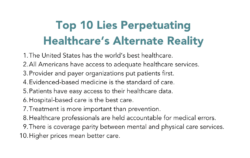January 13, 2022

Big Lies, Tyranny, Healthcare and American Democracy
Political and economic tyranny threaten the American democracy and its economy. Now representing 20% of the U.S. economy, healthcare is front and center in the fractious political debate and market-based efforts to reform the industry’s dysfunction. Importantly, fixing healthcare creates an opportunity to restore trust in democratic institutions.
Just over a year ago, insurgents attacked the U.S. Capitol. The January 6th insurrection constituted an orchestrated attempt to overturn the results of the 2020 U.S. presidential election. The “stop-the-steal” attack supports political tyranny. Without majority support, movements engaging in political tyranny employ authoritarian tactics to subvert democratic processes and seize control of governmental institutions.
In contrast to political tyranny, economic tyranny occurs when producers and/or buyers of particular goods and services subvert competitive market forces for their own financial benefit. Their rent-seeking behaviors distort market function and financially reward those with monopoly or monopsony pricing power. The U.S. healthcare industry imposes a form of economic tyranny on American consumers.
Both political and economic tyranny employ deceit to achieve their objectives. Overcoming tyranny in either form requires governmental actions to counteract tyranny’s repressive threats and powerful narratives to counteract its “big lies.”
Winning the hearts and minds of the American public is essential to success. As Abraham Lincoln noted in an 1856 speech, “Our government rests in public opinion. Whoever can change public opinion, can change the government…”
The U.S. will not create value-based healthcare until it addresses the economic tyranny operating within the healthcare industry. Understanding tyranny’s mechanics in both its political and economic forms is essential for achieving progressive healthcare reforms.
The good news is that empowered customers, liberated data and pro-market regulatory policies have the combined power to overcome a powerful Healthcare Industrial Complex®. These “force multipliers” are spearheading a consumer-led revolution to deliver value-based healthcare to the American people.
Political Tyranny: The “Stop-the-Steal” Campaign
Yale historian Timothy Snyder is a recognized authority on authoritarianism. Snyder’s best-selling book, “On Tyranny,” dissects the operations of authoritarian movements and offers twenty strategies for countering anti-democratic attacks. Snyder’s analysis has applicability for understanding this disruptive moment in U.S. healthcare.
 According to Snyder, authoritarian regimes use big lies to win public opinion as part of their campaigns to overturn vulnerable democracies. These lies trigger violent attacks, which in turn feed manufactured grievance, lead to more deceit, build support for authoritarian policies (i.e., more restrictive voting laws) and weaken civil liberties.
According to Snyder, authoritarian regimes use big lies to win public opinion as part of their campaigns to overturn vulnerable democracies. These lies trigger violent attacks, which in turn feed manufactured grievance, lead to more deceit, build support for authoritarian policies (i.e., more restrictive voting laws) and weaken civil liberties.
The authoritarian playbook often flips the roles of perpetrators and victims. That has happened in the United States. The former President first tried to overturn the results of a legitimate election and then claimed the other side stole the election from him. This big lie led to the violence at the Capitol, infects the nation’s political discourse and threatens the country’s democratic institutions.
Support for the “stop-the-steal” campaign has intensified in the wake of the January 6th attacks. Its big lies provide succor to true believers. It allows them to justify the election loss without examining the reasons for the loss. It allows them to blame others for their own failures and take revenge against those defending democratic institutions. It creates an alternative universe of beliefs that sustains authoritarian efforts to subvert American democracy.
Big lies are even infecting the public health campaign to combat the COVID pandemic. Unbelievably, 20% of Americans believe the government is inserting microchips into people through vaccines. Mask mandates, vaccine passports and social distancing policies are subjects of fierce political debates even as COVID hospitalizations hit record levels and COVID deaths approach 850,000. Political tyranny is promoting disease and death to win public opinion.
Defeating authoritarian campaigns requires powerful narratives that counter big lies. When successful, these counternarratives persuade stalwarts to abandon the cause. When enough do so, democracy prevails. It doesn’t take many. Most Americans believe the presidential election was fair. Converting five to ten percent of the ardent “stop-the-steal” supporters would be enough to eviscerate the campaign.
America has celebrated its independence and freedoms every July 4th since 1776. President Lincoln’s first July 4th address came shortly after the Confederate States succeeded from the Union and declared war against the United States. In his remarks, Lincoln synthesized the threat posed by a disgruntled minority operating within a democracy,
And this issue [the attack on Ft. Sumpter that triggered the start of the Civil War] embraces more than the fate of these United States…It presents the question whether discontented individuals, too few in numbers to control administration according to organic law…can break up their government, and thus practically put an end to free government upon the earth.
It forces us to ask, Is there in all republics this inherent and fatal weakness? Must a government of necessity be too strong for the liberties of its own people, or too weak to maintain its own existence?
As Lincoln notes, “discontented” minorities pose a fundamental threat to democratic government. It would be a mistake to assume that the current authoritarian challenge to American democracy will dissipate of its own accord. Enormous resources are fueling the “stop-the-steal” campaign and pushing to reinstate the former president. Widespread acquiescence by the majority creates the conditions that could allow “stop-the-steal” to succeed and topple our democracy.
Economic Tyranny: The Healthcare Industrial Complex
A powerful healthcare industrial complex tyrannizes Americans with a high-cost system that delivers suboptimal outcomes and fails to address an exploding chronic disease pandemic. The industry pursues its own interests at the expense of greater American society. It steals vital resources that reduce wages, limit innovation and stifle productivity.
Incremental COVID spending pushed healthcare spending to $4.1 trillion in 2020, representing 19.7% of the nation’s economy. Expect equivalent or greater levels of healthcare spending in 2021 and beyond. Massive structural imbalances plague the healthcare industry. During 2020, health insurance companies earned record profits (up 41.6% from 2019) while hospitals required a massive government-funded bailout.
The healthcare industry perpetuates an alternative reality that justifies its wasteful consumption. They support this alternative reality by promoting big lies.

Healthcare’s big lies harm consumers physically, emotionally and financially. Medical harm is a form of violence against the American people. The institutional drive to optimize revenues fragments care delivery, causes both overtreatment and undertreatment, tolerates medical errors, unnecessarily hurts and even kills some patients, limits care access, fosters care inequities and pushes far too many Americans into personal bankruptcy.
 Healthcare flips victims and perpetrators. It blames patients for their poor lifestyle choices and failure to adhere to treatment regimens. It uses predatory practices to collect unpaid medical bills. It does not take responsibility for the country’s dismal health status metrics. It expects society to fund inefficient, wasteful and often ineffective business practices without question or accountability. The industry spends lavishly on lobbying to support its rent-seeking practices.
Healthcare flips victims and perpetrators. It blames patients for their poor lifestyle choices and failure to adhere to treatment regimens. It uses predatory practices to collect unpaid medical bills. It does not take responsibility for the country’s dismal health status metrics. It expects society to fund inefficient, wasteful and often ineffective business practices without question or accountability. The industry spends lavishly on lobbying to support its rent-seeking practices.
Healthcare’s deceit leads to increasing consumer harm and more elaborate justifications for its value-depleting business practices. The cycle seems endless. Its results are catastrophic. Life expectancy in the United States has declined in four of the last five years. COVID has disproportionately hospitalized and killed individuals from low-income communities. Deaths of despair from drug overdoses, alcohol poisoning and suicide are rising.
Overcoming Healthcare’s Economic Tyranny
It will require more than passionate beliefs and stirring speeches to overcome the economic tyranny perpetuated on the American people by the healthcare industry. Without concerted and coordinated economic, political and social effort to counteract its cancerous growth, healthcare’s costs will rise to unsustainable levels. The healthcare industry will use its political muscle to frustrate fundamental reforms that make care more affordable and health companies more accountable.
This may be America’s last best chance to slay the healthcare industrial complex and deliver kinder, smarter and affordable healthcare to the American people. Fortunately, this customer revolution in healthcare comes with powerful force multipliers that strike at the heart of the healthcare system’s big lies and perverse economic structure. The following force multipliers are working in concert to turbocharge system-wide transformation.
- Empowered customers (buyers): self-insured employers, governments and individuals, who demand and receive more value for their healthcare purchases.
- Full-risk contracting vehicles: public and private insurance plans that align payment for episodic and ongoing care with performance, quality, transparency, service and value.
- Liberated Big Data: technology platforms that enable data to flow where it provides the most beneficial impact.
- New managerial systems: organizational architectures that push decision-critical information to situationally-aware frontline staff with the power to act on that information.
- Pro-market regulations: finely balanced regulation, monitoring and enforcement that support level-field competition without unduly burdening market participants.
- Transparent and accessible performance metrics: publicly available and understandable price information along with transparent quality, outcomes and performance metrics that enable consumers to make better health and healthcare choices.
Healthcare to Democracy’s Rescue?
Healthcare’s economic tyranny differs in one important way from the political tyranny now attempting to subvert American democracy. There are no alternative-universe worldviews nor competing narratives gaining traction with the American public.

West Health-Gallup’s “2021 Healthcare in America” report finds that over 70% of Americans of all political stripes believe they pay too much for the quality of healthcare they receive. Two-thirds of U.S. adults think voters have very little to no power in reducing the cost of healthcare in the U.S. Despite their profound sense of personal powerlessness, nearly nine in ten think that American businesses, corporations and the U.S. Congress do have the power to lower healthcare costs.
Even as big lies fracture political discourse, antipathy toward the healthcare industrial complex is a great unifier of American public opinion. The belief that business and government have the power to drive progressive healthcare reforms creates an opportunity to persuade more Americans that democratic government and competitive markets can improve their well-being.
In this way, healthcare policies that create value and improve the lives of everyday Americans also can help restore confidence in American democracy. The alternatives are almost too scary to contemplate: runaway healthcare spending; a sicker society; increasing public distrust and broken government.
During the depths of the Civil War in December 1862, President Lincoln ended his annual message to Congress with this poignant observation:
We shall nobly save, or meanly lose, the last best hope of earth [American democracy]. Other means may succeed; this could not fail. The way is plain, peaceful, generous, just — a way which, if followed, the world will forever applaud…
The way forward in healthcare is equally plain, peaceful, generous and just. All Americans deserve great healthcare that doesn’t break the bank. Value-based care that promotes individual and community well-being cannot fail. Progressive healthcare reforms may be the best hope for regaining and preserving the trust of the American people in their democratic form of government. Once achieved, the world will forever applaud.





